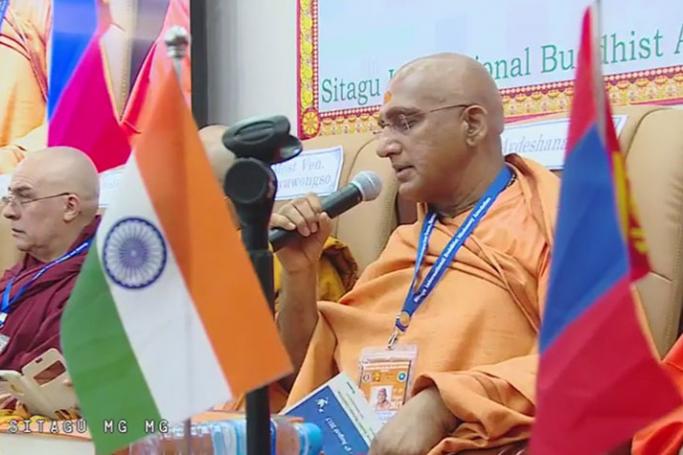Myanmar National Security Advisor U Thaung Tun today called for interfaith dialogue to promote peace and harmony.
Speaking at the Dialogue for Peace, Harmony, and Security currently underway in Yangon, the NSA advisor stated:
“In a 2003 UN General Assembly resolution, the nations of the world affirmed that ‘inter-religious dialogue is an integral part of the efforts to translate shared values into action.
“This is why we are here today, and it is fitting that we do this in Yangon. The city was founded as Dagon, but, to mark the end of conflict, it was renamed Yangon, which means ‘end of strife’.
“This is our aspiration: to end strife and suffering for all people.”
The Dialogue, which runs 5-6 August and is hosted by the Sitagu International Buddhist Academy, brings together religious and spiritual leaders and scholars representing a number of religions from around the world including neighbouring India.
U Thaung Tun highlighted the similarities between all religions and that adherents of different faiths systems can work together to achieve peace:
“All the great religions of the world share the goal of a peaceful world. All their founders taught tolerance and non-violence. All the sacred scriptures call for harmony between peoples. We all believe in peace, friendship, and respect.
“It is incumbent on leaders to preach these principles so that followers may see that they are the right path – not the ideals spread by those who hate.”
The NSA advisor noted that Myanmar fights against extremism every day and is committed to ensuring freedom of religion:
“Our constitution clearly states that ‘every citizen is equally entitled to freedom of conscience and the right to freely profess and practice religion’. We are proud to make this commitment, just as we are proud to dedicate ourselves every day to building peace and lifting hardship and suffering…
“Every day we fight against extremism, and we fight the spread of fabricated stories meant to foment hate. Whether these problems originate abroad or at home, they cause the same atrocious problems. This has no place in our society, which is a rich tapestry of peoples.”
He also addressed his role as national security advisor and his focus on building interfaith relationships:
“When people hear security, they think mostly of physical aspects of defense. But it is so much more than that. We, here, are on the front lines of promoting peace, harmony, and security.
“Building relationships across faith is how we build peace. It is how we create harmony. It is how we maintain security.”
The NSA advisor also noted the challenges the new media environment has created:
“The forces that feed conflict have been around for centuries and even millennia. But they are expressing themselves in new and creative ways that are testing our collective ability to maintain peace and harmony.
“The internet has empowered extremists to send their hateful message far and wide, transcending national borders. It has also facilitated the spread of falsehoods more easily than ever before. When messages are spread in this fashion and used as a weapon, it disrupts peace and stability and causes conflict. It disrupts the very notion of truth and fact.”
The gathering to discuss how members of different religions from around the world could live in harmony was held in the commercial capital of Myanmar, a country currently facing tension between people of different faiths.
Nationalist protestors have called for the Myanmar government to step down over what they claim is a failure to protect the country and its primary religion Buddhism. Communal tensions have been reported in several parts of the country. A key flashpoint is the northern area of Rakhine State, which borders Bangladesh.
You are viewing the old site.
Please update your bookmark to https://eng.mizzima.com.
Mizzima Weekly Magazine Issue...
14 December 2023
New UK Burma sanctions welcome...
13 December 2023
Spring Revolution Daily News f...
13 December 2023
Spring Revolution Daily News f...
12 December 2023
Spring Revolution Daily News f...
11 December 2023
Spring Revolution Daily News f...
08 December 2023
Spring Revolution Daily News f...
07 December 2023
Diaspora journalists increasin...
07 December 2023
Guatemala leader vows to stand by 'solid' ally Taiwan












